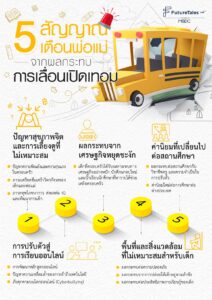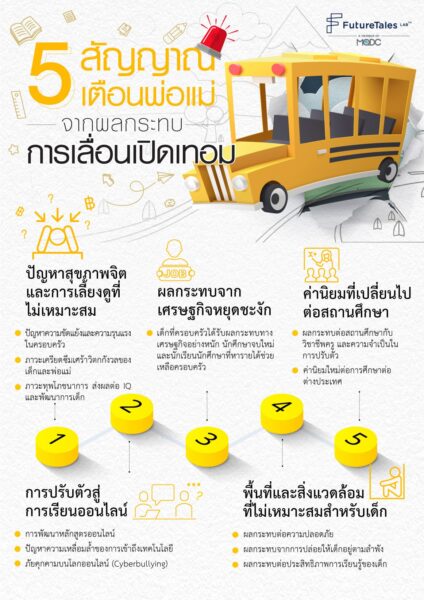
In response to the COVID-19 outbreak the Ministry of Education has postponed the start of term from mid-May to 1 July 2020. Schools are currently closed in 186 countries, affecting up to 1.3 billion students, or 73.8% of children and teenagers worldwide.FutureTales Lab by MQDC has therefore analyzed the effects to gather information for parents, guardians, and educational staff to cope with school closures.
Dr. Karndee Leopairote, Chief Advisor to the FutureTales Lab by MQDC, said: “There is a major impact from schools being closed. World Bank analysis into long-term school closures shows a reduction in the learning curve for children who are at home for a long time. Not being taught at the start of the school year may cause children’s learning efficiency to drop. Staying at home for more than 6 months can result in children losing knowledge of about half of the academic year. These problems are issues for parents, guardians, educational institutions, and related professionals. A response plan is vital to reduce the impact on children, who are the future of the country.”
Ms. Wipattra Totemchokchaikarn, a Foresight Researcher at FutureTales Lab by MQDC, said that “Web of Impact” analysis shows the direct and indirect effects, covering society, technology, economics, the environment, politics, and perceptions. The research spotlights 5 dangers for parents from the delayed start of school.
1.Mental health and limited nutrition
Children from needy families in particular rely on breakfast and lunch at school. School closures can cause these children to experience malnutrition, affecting their development and intelligence. Government and related agencies need to inform parents about child care and help look after children whose parents cannot supervise them. Intervention should focus on early childhood groups and vulnerable children at primary level. Special early childhood development centers could cater for school-age children while still maintaining physical distancing.
Another issue is the mental health of family members, with stress, anxiety, and depression among children and parents. Conflicts and domestic violence may occur more during this period. Depression can have different symptoms in children and adolescents than in adults, such as problems with schoolwork, irritability, aggression, introversion, or dangerous behavior such as self-harming, addiction to games, and alcohol or substance abuse. Parents should pay more attention to their children’s mental health by providing quality family time and opening their hearts so family members can listen to each other. If more problems emerge, consult the mental health hotline (1323) of the Department of Mental Health under the Ministry of Public Health. Parents can turn to online psychiatric consultation in this situation.
2.Adjustment to online learning
Some schools have started to adapt to online teaching with courses for parents to participate in their children’s education. But many major challenges remain, such as a failure by some schools to adjust. Equipment and online courses may be unavailable. Teachers or parents may lack the skills to support online teaching. Some children do not live with their parents. Access to technology may be lacking, especially for needy families. Children also face online dangers such as threats or cyberbullying that parents may not know about. Parents therefore need to be more careful about child safety.
3.Effects from economic disruption
Lockdown measures have hit the economy hard. Entrepreneurs have been severely affected and some workers have lost their jobs unexpectedly. The financial status of many families has changed and children might fall out of the education system to help with work at home. Families might also lack the income for school fees. The effects of this may permanently change children’s lives. Businesses involving children such as theme parks, tutoring institutions, or even schools may shut down. Students may have to change their education plans or work to earn extra money while studying because of the lockdown. Job opportunities for new graduates might be fewer or more competitive. Teens can consequently experience heavy pressure and accumulate stress.
4.Learning areas
Every child should have a safe and suitable area for learning and living. Equitable Education Fund (EEF) found that over 30% of Thai children have no private room to study in or do their homework. But needy children are even less likely to have one, which might put them under stress, struggling to concentrate on studying, learning, and working efficiently. Some children may also be left home alone because their parents are in professions where they cannot work at home, putting the safety of their children at risk.
5.School values
Schools and teachers may shift their focus. Online study may reduce the importance of classroom study or make “Hybrid Homeschooling” more prevalent. These concepts can affect educational institutions and the teaching profession. The value of studying abroad is also directly impacted. China is heavily affected in this respect, with international students now down to 21% of its educational institutions.
“FutureTales Lab by MQDC has analyzed the dangers from postponing the start of the school year to help the government, businesses, educational institutions, and the parents of all families to prepare for these scenarios and take better care in this situation of children, who are the future of the nation,” said Ms. Wipattra.




